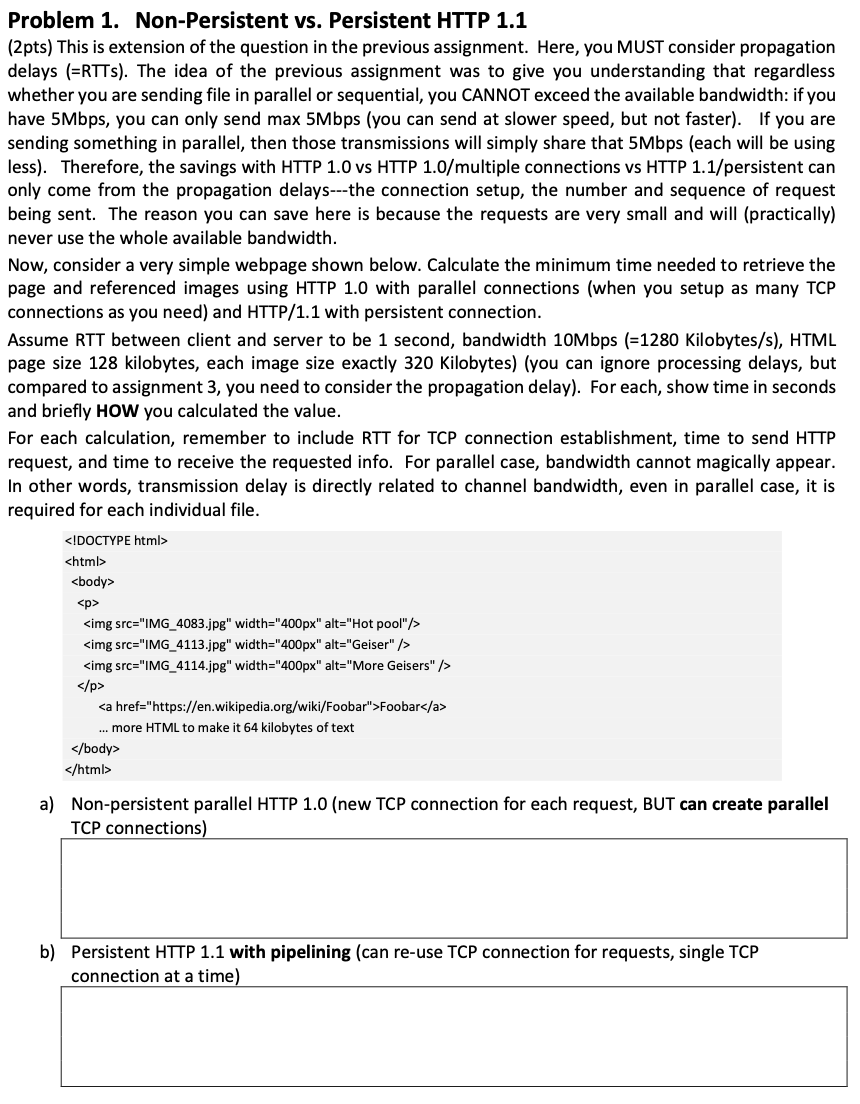Answered step by step
Verified Expert Solution
Question
1 Approved Answer
Problem 1. Non-Persistent vs. Persistent HTTP 1.1 (2pts) This is extension of the question in the previous assignment. Here, you MUST consider propagation delays

Problem 1. Non-Persistent vs. Persistent HTTP 1.1 (2pts) This is extension of the question in the previous assignment. Here, you MUST consider propagation delays (=RTTs). The idea of the previous assignment was to give you understanding that regardless whether you are sending file in parallel or sequential, you CANNOT exceed the available bandwidth: if you have 5Mbps, you can only send max 5Mbps (you can send at slower speed, but not faster). If you are sending something in parallel, then those transmissions will simply share that 5Mbps (each will be using less). Therefore, the savings with HTTP 1.0 vs HTTP 1.0/multiple connections vs HTTP 1.1/persistent can only come from the propagation delays---the connection setup, the number and sequence of request being sent. The reason you can save here is because the requests are very small and will (practically) never use the whole available bandwidth. Now, consider a very simple webpage shown below. Calculate the minimum time needed to retrieve the page and referenced images using HTTP 1.0 with parallel connections (when you setup as many TCP connections as you need) and HTTP/1.1 with persistent connection. Assume RTT between client and server to be 1 second, bandwidth 10Mbps (=1280 Kilobytes/s), HTML page size 128 kilobytes, each image size exactly 320 Kilobytes) (you can ignore processing delays, but compared to assignment 3, you need to consider the propagation delay). For each, show time in seconds and briefly HOW you calculated the value. For each calculation, remember to include RTT for TCP connection establishment, time to send HTTP request, and time receive the requested info. For parallel case, bandwidth cannot magically appear. In other words, transmission delay is directly related to channel bandwidth, even in parallel case, it is required for each individual file. < Foobar ... more HTML to make it 64 kilobytes of text a) Non-persistent parallel HTTP 1.0 (new TCP connection for each request, BUT can create parallel TCP connections) b) Persistent HTTP 1.1 with pipelining (can re-use TCP connection for requests, single TCP connection at a time)
Step by Step Solution
There are 3 Steps involved in it
Step: 1
a Nonpersistent parallel HTTP 10 In this scenario we will establish a new TCP connection for each request but we can create parallel TCP connections T...
Get Instant Access to Expert-Tailored Solutions
See step-by-step solutions with expert insights and AI powered tools for academic success
Step: 2

Step: 3

Ace Your Homework with AI
Get the answers you need in no time with our AI-driven, step-by-step assistance
Get Started


